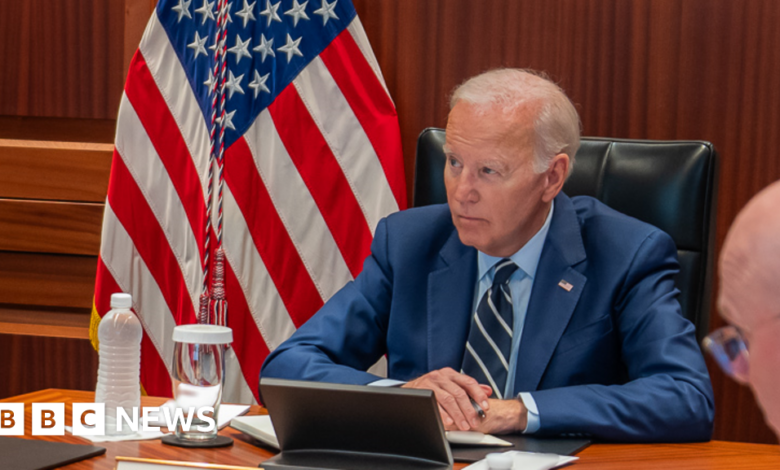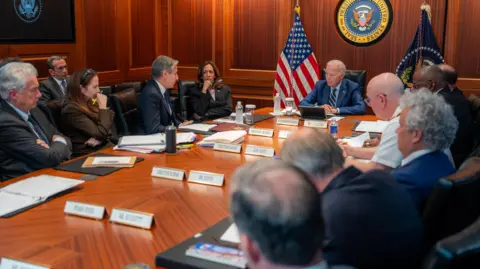Biden convenes national security team as fears of Iran attack grow

 White House/ X
White House/ XUS President Joe Biden met with his senior national security team on Monday as concerns grew about a possible Iranian retaliatory attack on Israel.
Mr Biden said he had been briefed on preparations to support Israel in the event of an attack, while Secretary of State Antony Blinken said officials were working “around the clock” to prevent the situation from escalating.
Tensions have been rising over the past week following the assassination of Hamas political leader Ismail Haniyeh, which Iran blamed on Israel and vowed to retaliate “severely”. Israel has yet to claim responsibility for the assassination.
Many countries, including the United States and the United Kingdom, have also told their citizens leaving Lebanon, where there are concerns that Hezbollah, an Iran-backed militia and political movement, could play a role in any response.
At a press conference on Monday, Mr. Biden was told that the timing and nature of an Iranian attack remained unclear, according to US news site Axios. A day earlier, Mr. Blinken reportedly told his G7 counterparts that Iran and Hezbollah could attack Israel within 24 to 48 hours.
In a statement released after the press conference, Mr. Biden said: “We have received updates on the threats from Iran and its proxies, diplomatic efforts to reduce tensions in the region, and measures to prepare to support Israel if it is attacked again.”
He added that steps were being taken to respond to attacks on US forces “in a manner and place of our choosing.” On Monday, Several US personnel were injured. in a suspected rocket attack on a US military base in western Iraq.
Speaking to reporters earlier in the day, Mr Blinken said officials were “engaged in intense diplomacy almost around the clock with a very simple message: All sides must refrain from escalation”.
“Escalation is not in anyone’s interest. It only leads to more conflict, more violence, more instability,” he said.
He added that the ceasefire would “open up the possibility of achieving a more lasting peace not only in Gaza but also in other areas where conflict could spread”.
“It is imperative that all parties make the right choices in the hours and days ahead,” he said.
His comments came after Mr Biden spoke with Jordan’s King Abdullah II earlier in the day. They discussed “their efforts to reduce tensions in the region, including through an immediate ceasefire and an agreement to release hostages”, a White House statement said.
A joint G7 statement also expressed “deep concern about the rising level of tensions in the Middle East, which threaten to spark a broader conflict in the region”.
“No country or people can benefit from further escalation in the Middle East,” the report said.
Talks that had brought renewed hope for a ceasefire to end the conflict in Gaza have collapsed following events in recent weeks.
July 27, 12 children and teenagers were killed in an attack on the Israeli-occupied Golan Heights. Israel accused Hezbollah of carrying out the attack, although Hezbollah denied any involvement.
Days later, Fuad Shukr, a senior Hezbollah military commander, was killed in an Israeli airstrike on the outskirts of the Lebanese capital Beirut. Four others, including two children, were also killed.
Hours later, Haniyeh was assassinated in Iran.
Iran’s Revolutionary Guard Corps (IRGC) said Haniyeh had killed in a “powerful explosion” by a “short-range projectile” fired from outside the house where he was staying while visiting the capital Tehran.
Palestinian President Mahmoud Abbas said in an interview with Russian state news agency RIA Novosti that the killing would “have a negative impact on the ongoing negotiations”.
Israel has not commented on the assassination, but Israeli Prime Minister Benjamin Netanyahu later said Israel had dealt “crushing blows” to Iranian proxy groups in recent days.
Following the killings in Lebanon and Iran, the IRGC said Israel would receive “severe punishment at the appropriate time, place and manner”, while Hezbollah leader Hassan Nasrallah declared the conflict had entered a “new phase”.
This is the latest escalation of the conflict since April, when Iran fired about 300 drones and missiles in Israel in response to an Israeli attack on the Iranian consulate in Syria that killed several senior military commanders.
Flights suspended
Jordan on Monday required all airlines planning to land at its airports to carry an extra 45 minutes of fuel, a move seen as a precaution in case Jordan has to close its airspace during a regional conflict.
German flag carrier Lufthansa has suspended all flights to Tel Aviv, Tehran and Beirut until August 12.
US airline Delta has also suspended flights to Tel Aviv until at least August 31 “due to ongoing conflict in the region”.
The Foreign Office is now advising against travel to Lebanon and urging British nationals in the country to leave.
The agency also advises against travel to the northern region of Israel that shares a border with Lebanon.
The conflict in Gaza began after an attack on Israel by Hamas and other militant groups on October 7, which left some 1,200 people dead and 251 others taken back to Gaza as hostages.
More than 39,600 Palestinians have been killed since Israel launched its retaliatory ground offensive on Gaza, according to the Hamas-run Health Ministry.
Hezbollah and Israel have also carried out near-daily attacks since the conflict began, killing hundreds and displacing thousands on both sides of the Israel-Lebanon border.
Hezbollah and Hamas are both backed by Iran and are part of what Iran calls the “axis of resistance,” a loose alliance of political and military groups across the region that oppose Israel and its main ally, the United States.





